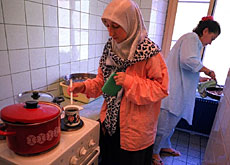Vote reveals extent of unease over asylum

The rightwing People's Party's call to tighten the asylum laws has struck a chord with Swiss voters, nearly half of whom supported the proposal on Sunday.
Political analysts told swissinfo the outcome sent a clear message that politicians must take more seriously calls for a stricter asylum policy.
“We’re confronted with the feeling that nothing has really been done with the refugee issue,” said Julian Hottinger, senior researcher at the Institute of Federalism, Fribourg University.
“People weren’t really looking to pass the initiative. They were saying that a solution has to be found so that what we call real refugees can be accepted into the country and those who are fake refugees or economic refugees are not taken care of.”
Emotional reaction
It’s a view shared by Uli Windisch, professor of sociology at Geneva University and author of a book on the Swiss and immigrants.
“When more than a million people vote like that, you can’t keep saying that people are reacting emotionally and that we’re dealing with xenophobia or racism,” he told swissinfo. “It’s time to really listen to the people.”
Another reason cited for the narrowness of the vote is the inability of the leftwing parties to present an agenda on asylum.
“I think to a certain extent the Left is embarrassed with these kind of initiatives,” Hottinger told swissinfo. “It doesn’t have a real answer.
“There was no counter-project to this initiative itself. And the feeling is that, apart from saying it is not politically correct, [the Left has] difficulty saying that these are key issues which have to be looked at.”
Urban protest
All the French-speaking cantons and Italian-speaking Ticino voted against the initiative, which would have effectively closed to door on 95 per cent of asylum speakers. Many German-speaking cantons voted in favour of the proposal.
However, the linguistic split appears to be less important than the message of support from urban and semi-urban areas where the Swiss People’s Party does not usually enjoy so much success.
Jürg Schertenleib, spokesman of the Swiss Refugee Council accepts that some of the fears have a real and concrete base but says the title of the initiative was misleading and inviting.
“It says that one should fight against abuse of the asylum system but if we look at the contents of the initiative, it would have led to the abolition of the Swiss asylum system,” he told swissinfo.
“Almost nobody could have asked for asylum anymore in Switzerland and it was very difficult to make that clear to the voters.”
Unworkable
Even among supporters there’s widespread consensus that the initiative would have been unworkable.
It said that asylum seekers arriving from so-called “safe” countries – Switzerland’s neighbours – would be sent back to have their applications processed. That would have required the consent of the country which the asylum seeker travelled through to reach Switzerland.
“This was one of the major stumbling blocks as it is a violation of international law,” explained Hottinger.
“In Swiss democracy, [people’s] initiatives have two roles. You can either try to get your initiative through or you can use it to apply pressure on the system so that when the government drafts a new law it will have to take into account elements you have put forward. This is what the People’s Party was really looking for.”
Analysts agree the outcome of the vote will influence the government’s position on asylum. But they say future policy will also be strongly conditioned by what has been decided in the European Union.
One of Switzerland’s stated foreign policy goals is to join the EU’s Schengen and Dublin agreements, which govern the movement of people and asylum seekers throughout signatory countries.
swissinfo, Vincent Landon
On Sunday, Swiss voters rejected a rightwing proposal to tighten asylum laws.
Of 2.2 million votes cast, a tiny majority of 3,422 came out against the initiative.
It’s the closest vote on a people’s initiative since 1891.
Voter turnout was just under 47 per cent

In compliance with the JTI standards
More: SWI swissinfo.ch certified by the Journalism Trust Initiative


You can find an overview of ongoing debates with our journalists here. Please join us!
If you want to start a conversation about a topic raised in this article or want to report factual errors, email us at english@swissinfo.ch.